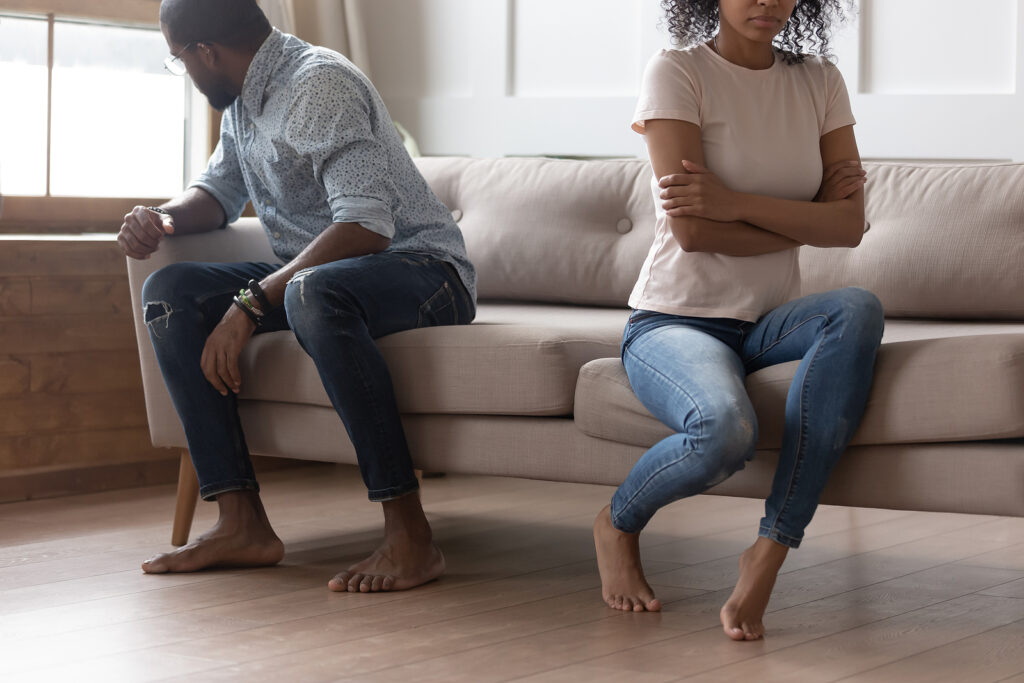What makes a relationship healthy? Learn more here!
Conflict is never a fun topic to discuss, let alone be engaged in. Many of us fear conflict because it could unveil our biggest fears or worse break up a relationship we have worked so hard to maintain. Many individuals who avoid conflict and confrontation often relate it back to their childhood when they experienced conflict in their own families. Whether that was a debate, arguing, people raising voices, or disagreeing, many people have never seen conflict handled in a healthy way. If you need support in what makes a relationship healthy, read on.
Couples Therapy and Couples Arguing in Sessions

Some people when they think about couples therapy instantly have a pit in their stomach. Some people have the idea that couples and marriage counseling, means the end of your relationship. That isn’t the case. However, if you are coming to online couples therapy and all you can do is yell at each other for the whole session, something is wrong. For many therapists, the session ends when yelling begins. When emotional flooding enters the room, no productive work can be done. The truth is that if you’re playing out what happens at home for most of your sessions that’s not productive couples therapy. What we don’t want from couples therapy is to play out the conflict from home. That is not why you pay for therapy, we are working to create different outcomes in the therapy setting so you can handle it on your own outside of this space.
Rules of Couples Therapy One May Follow Includes:
Talk to your therapist rather than directly to each other unless your therapist directs you to do so. Know that all relationships have conflict. It’s not just that it’s inevitable for relationships to have conflict. It is essential. It’s necessary and it’s necessary for growth and it actually builds intimacy if it’s done right. Oftentimes people evaluate their relationships, particularly their marriage or their romantic partnerships based on how little conflict there is. So you may run into the couple that says “ We get along really well, we don’t fight. We never fight!”. However, all the literature shows, all the research shows, that those who don’t fight, have a higher predictability of divorce. So, that’s not a good measurement for the quality, the stability, the connection, or the intimacy of a relationship.
Conflict is necessary to what makes a relationship healthy
Conflict is essential and necessary because we all have to move through stages of mismatch. So think about other systems. Think about the animal kingdom. Think about nature. Storms have to happen for things to change, look for the landscape to change, a tornado comes through and it changes the landscape. Yeah. A tornado is devastating. We don’t want tornadoes happening in your relationship, but I frame it in that way because that’s a system, an ecological system, and so are our relationships. If we think of it that way, it’s not individuals, it’s an ecosystem. And what one does affects the other. Conflict allows there to be messiness, growth, and evolution, to occur.
Take This For Example…
There’s a really great video on YouTube of an infant interacting with her mother. It’s by Ed Tronick and it’s called The Still Face Experiment. It’s important. Some people become upset, a lot of people find it funny, and others find it fascinating.
Essentially what is happening is that the mom’s not responding. Baby gets distressed, arches her back, starts to cry, and starts to point. And then mom comes back into engagement with the baby and that repairs things for the baby. And they’re back in harmony. Baby gets her needs met, right? The baby needed the mom to engage.
Well, think about how many times for anyone out there who has children or remembering when you were a child, yourself, there are many moments where we fall into those moments of being out of sync with whoever we’re with. And this is kind of, a really amazing thing, which hopefully will be a relief to hear, which is on average, 70% of our interactions, in relationships are out of sync. And I say that should be a relief to hear because when that level of mismatch or conflict is occurring, it’s normal.
When is this abnormal?
What’s abnormal is if it’s far lower, or far higher. Look, we do have to take into account too much conflict. As well as too little, too much conflict and how that conflict plays out is unproductive and unhealthy. Too little conflict, the avoidance of conflict, is also unhealthy.
So what we want to be able to do is manage successfully those periods of harmony, disharmony, repair, and then back to harmony. But people get really stuck in relationships causing us to fall into disharmony. And then moving into this like pseudo fake repair it’s it seems like harmony again, but it’s not really, nothing’s been addressed. Nothing’s been negotiated. Nothing’s been resolved. I mean, a lot of conflict doesn’t get resolved. It gets managed instead, which is a healthy thing for it to be managed. It’s going to come up again. It’s okay. That it comes up again. We’re going to manage it over time. What we put in place might work for a while. A solution, a compromise might work for a while until it doesn’t, and then we have to renegotiate.
What makes a relationship healthy is not a pseudo repair
The pseudo repair thing should resonate because it’s like being angry at each other and then saying, “I don’t want to be angry anymore, I forgive you”. I’m sorry. You’re sorry. You forgive me. Then it’s never really been addressed. It’s not like we talk about it, I was hurt when you said this and etc. I mean, I don’t know. I’ll, I’ll wait to hear what your recommendations are about the best ways I know. I can. I’m sure I have a lot. I can learn here. That will be helpful for me too, but, but that pseudo repair, it’s like, “oh, I thought everything was fine, that was a couple of days ago”. Yeah. We talked about it and talked about it is like saying, sorry and saying you forgive each other, but, It’s not really addressing the major issue.
Many of Us Were Not Taught The Skills to Deal with this Conflict
Addressing the issue is very different and it takes skill. It takes skill. Most of us are not taught these skills. Instead, we download the template for how to be from the families we grew up in. This includes:
- how to manage upsets
- And how to respond when we’re upset
- how to deal with anger.
Oftentimes, those are not the healthiest templates for strengthening relationships or having the intimacy in our relationships that we want. And what is intimacy? Some define it as the intersection between truth and love. In an intimate relationship, you can really love somebody and speak the truth. This hurt. That’s not okay with me. So on and so forth. And, still remain connected. You can protect yourself. And remain connected. That’s intimacy where the boundaries are appropriate, where you can, as I said, be protected and connected.
Protecting yourself doesn’t have to mean disconnecting.
What matters here is trust. Why repair? As part of the process of dealing with conflict, it is so important because it builds trust. When there is no repair, it degrades trust. This may also make you consider how most people therapists work with, they have childhood trauma, and how trust can be so difficult when you have trauma. The truth is that the wounds of attachment disruption that were never repaired are all there.
Did you know when a conflict comes up, it’s easy to just follow that template and say, “oh, this, this means this is happening, they don’t love me, I can’t trust them”. They’re going to leave me whatever it is. This is why everything I talk about with regards to conflict and what I call the intimacy circuit applies to our relationship, not just with others, not just with our partner or our spouse, but with ourselves. Part of healing trauma, is about the relationship with yourself, developing the boundaries for yourself to protect yourself and discerning when it’s safe and when it’s not safe, and trusting yourself to discern that.
How Does Trauma Influence Our Relationship Disconnects
Trauma really makes you not know, like you really can get disoriented with what is real. So yeah, that trusting yourself, that’s big work. The skills that you need to support proper learning and strengthening those muscles. And so I referred to the intimacy circuit before and I’ll describe what I mean by that.
So I call it the intimacy circuit, because if we think about it as similar to an electrical circuit. Along the pathway of this circuit, there are elements where, when we’re disconnected from one of those elements, the circuit is broken, right? The energy doesn’t continue through it. If we’re talking about electricity. And so it stops working. So we disconnect from intimacy when we disconnect from one of these six elements. That conflict is a part of the circuit. Okay. I remember right at the top of this, I said, it’s essential. It’s not just okay that conflict happens. It’s necessary. So I’ll briefly mention each of the six items in the circuit.

What Makes a Relationship Healthy in the Circuit is self-worth.
The first is our own connection to our self-esteem, that connection to the unwavering truth that is, we are all worthy of love and belonging and the ability to hold ourselves, with warm regard, flaws and all. So our self-worth is such that we’re born with it. Everybody is born with it.
You don’t earn it. You don’t ever have to earn it. Not by getting good grades, not by getting that job. Not by looking a certain way. We all inherently have that self-worth but we get disconnected from it for many, many different reasons than because of many, many different things that happen to us, a trauma in particular.
The second is boundaries, emotional boundaries, certainly physical boundaries.
I don’t skip over that lightly. It’s just a more obvious one, our physical boundaries between us and others. But I mean this more about our emotional boundary of who we let in and who we let in how much, as well as, how much of ourselves do we let out into the world emotionally that it’s like a dimmer switch, our boundaries, that we can turn up or turn down based on who we’re interacting with. You’re my friend. I’m going to tell you a lot more of what’s going on in my life than I’m going to tell this wonderful person that I just met at a dinner party, who I think I’d probably be really good friends with over time.
Additionally, I’m not going to tell her right away things that are going on in my life, just as if she said something to me that I thought was hurtful. I’m not going to let it in through my boundary as much as I would if you had said the same thing. Because you’re closer to me, so what you say matters more to me. This is the kind of thing. I mean, when I say boundary. And I can’t help, but think of the timely thing that’s happening right now.
Consider How Simone Biles Set Boundaries for Herself
Simone Biles has chosen to step back from the Olympics from competing, what a fabulous display of boundaries for herself. She had the weight of the world on her shoulders. And she, as I see it, in many other ways has said, I’m going to pull back, even though it’s going to upset people, this isn’t about who it upsets. I’m going to do what I need to, for me. What an amazing display of boundaries. How many times have I, I know I have said to myself, well, I have to go to that because they’ll be upset if I don’t go.
And this isn’t the Olympics, this is like some party or something. She’s the only one who has to deal with the consequences, of doing what everyone else wants her to do. Or, she’s, she’s the only one who benefits when she does what she needs, but that’s the only thing that matters. It’s her life. It’s a beautiful way of protecting herself and she is a survivor of sexual abuse.
So, I just really applaud her and, I mention it because I think we all need to think about that for ourselves. I actually said to my daughter the other day, as she was trying to make a decision about whether she was going to attend something or not, I said, sweetheart, this is a Simone Biles decision for you, like it’s okay to take care of yourself. You make the decision that you need. It had, it was nowhere near as big as pulling out of the Olympics. But I think we all have those Simone Biles moments in our lives.
Personal accountability is number three, in the circuit.
Okay, in the intimacy circuit. And what I mean by that is when we mess up, which we all do is take ownership of it, holding ourselves accountable to not only ourselves and how we show up in the world, but to our relationships and our impact on them. I said before relationships are an ecosystem. If you behave in a certain way, it’s going to invite a particular response from your partner. So if you scream and yell and you wonder why your spouse is screaming and yelling at you, right? We’re going to invite that kind of response. And the only thing we have control of is ourselves. Nobody else.
So that’s where personal accountability comes into the intimacy circuit. If I can hold myself accountable for my behaviors, it will keep me in connection with the other person just as self-worth and boundaries will. It’s very clear to me that if my partner is accepting their own responsibility or holding themselves accountable for their part, I’m, first of all, I’m much more comfortable doing that for myself, but also I just feel more trust in them because they’re not deflecting blame, you know. It makes it safe, and that’s an essential part of a healthy, intimate relationship is safety.
So the next part in the intimacy circuit is vulnerability.
The willingness to put yourself out there, which could look like something as simple as saying, I’m really sorry. I did mess up. I said I was going to be home at five o’clock and I didn’t show up until seven and I didn’t call you putting yourself out there. It’s you know, being vulnerable means finding the path to remaining connected to the other person while also protecting yourself. The two go hand in hand. Vulnerability doesn’t mean laying yourself bare so that you can be hurt. There’s reasonable self-protection as well, but self-protection doesn’t mean going behind a wall, becoming silent, or walking away. It means remaining engaged, holding yourself firm let’s say, in your beliefs about something while hearing what the other person has to say and taking their perspective into account, protected and connected.
I haven’t met one couple in my office where they see the situation or the interaction, in the same way, makes sense. They have different perspectives, different histories, different backgrounds, and different families they grew up in, and this is true in my relationship with my husband. And I see things differently all the time, but I need to be able to put my perspective out there, even though it’s going to differ from his. And protect me, while remaining connected to him by knowing that his different perspective is not a threat to me, I can still engage with him. He can have a different belief about something, how we behave around him is what matters.
How do Protective and Not Losing Yourself Intertwine?
If we look at boundaries as a continuum, losing yourself in their perspective would be boundary-less, right? It swings to the side of, well, I have to see it their way. I don’t maintain my opinion, my beliefs, my thoughts. I have to morph myself into how the other sees things. And if we swing to the other end of the pendulum of boundaries along the continuum, we close off. I don’t take in anyone else’s perspective. My way of seeing things is the only way of seeing things. If I even let you know how I think, because I may close off where I don’t let out, what I think, those two ends of the spectrum are not healthy places to be, we want to be in the middle. And that’s how we stay protected, emotionally.
The fifth would be empathy as part of the circuit
We all tend to know it, the ability to put yourself in someone else’s shoes to understand their perspective and understand what they’re feeling, even when you experience it differently. There are other elements of empathy. I’m not going to go into all the details, but there are different forms of empathy and it’s actually a skill that we can learn, which is empathy. When you’re in conflict with your partner, like giving them the benefit of the doubt or assuming, you know them to be not a bad person, I don’t know. That might not really fall into the way you’re using empathy here, but it’s like, I can see their perspective, even if it’s not the same as mine, so I can listen to what they’re saying and not just be like, what are you talking about?
How could you possibly think that or things like that, is that what you’re talking about? It’s certainly an element of it, for sure, for there to be room in our minds for how the other person is different from us. And empathy allows you the space to be able to do that.
The sixth element of the intimacy circuit is establishing a connection.
When I speak of connection under the guise of conflict as well, right. It’s the ability to learn to make repairs, to actually get back into genuine harmony and not just gloss over, not just say I’m sorry, but to actually repair the break in connection that has happened. And that inevitably happens and is part of being in a close, intimate relationship. And all of these elements are essential for having an intimate relationship and often need support and help to learn how to do, how to do it well, and it’s a lifelong kind of endeavor.
It’s like, it’s a practice much like meditation. That it’s not like you just get good at it and you’re done with it. You practice every day in a different way, right, with whatever comes up. So like tomorrow for my practice, if I was wanting to criticize my husband and see if we can stir something up, well, how, how do people practice it? It’s not like that I’m sure.
How do I manage this for next time?
So the next time you find yourself in a situation where there’s clearly disharmony. Right? One of the things I encourage people to ask themselves is what part of me is speaking right now? Is it, is it the wise connector, part of me, the one that wants to be connected?
Or, is it the adaptive, reactive, part of me, sort of the primitive reactive part of me, where you feel that what we call whoosh, all of a sudden that sort of comes over you. The next thing you know, you’re saying all these ugly things, or you’re storming off, or you’re, you know, giving the silent treatment. Or you’re slamming doors. That’s the reactive part of us. We all have it. It’s normal. It’s supposed to be there. It serves a purpose and we need to practice shifting from that reactive part of ourselves into the wise, connected, flexible, calmer, part of our brains.
Consider this as an approach
What part of me is speaking to my partner right now? And the personal accountability piece of that is looking at yourself, not looking at him and saying he’s being reactive, it’s his fault. No, no. What are you doing, right now? That’s personal accountability.
He’s responsible for his side of the street. You’re responsible for yours. And if you bring your wise connector to the conversation, it’s going to go a lot better. Even if he’s not in that same space. I’m saying he because I’m thinking of my husband and your husband, but obviously could be she, or they, or them.
Is this approach something that only works with people can do only in couples therapy?
Of course not, I think it’s something that we can all do on an individual basis as well with, uh, you know, with an individual therapist, if, if that’s the route that you take. It is helpful for that person to have a systemic view right, of relationships. And to know that when, even when there’s one person in the room that they’re working with, that they’re actually working with a part of a system. You know, therapy is not the only way, to work on this, but just to learn more about it. Go ahead and find a podcast and just start going for a walk and listening to some audio for additional support.

Find a Trauma Therapist Near Me Today!
I hope you found support and guidance on where to find resources and continue to grow as an individual and a therapist. Know that no article or podcast can substitute for talking with a qualified therapist. You can usually speak to them by phone before scheduling an appointment to make sure they feel qualified to help with the issue that affects you.
Finding a therapist who understands the effects of dealing with attachment issues, trauma, or dissociation and has specialized training in trauma recovery can make a huge difference. Additionally, taking the steps to address the trauma from your childhood can improve your current relationships. Trauma therapy is here to help. Whether it is for your own trauma or the trauma of someone you care about. Don’t keep suffering. Reach out for the helping hand of a trauma therapist. The first step is understanding that your trauma is real, that it matters, and that you can feel better. Then the hard part comes – trusting a therapist to help you. I know there are many caring and skilled trauma therapists out there who want to help. Find A Trauma Therapist by clicking here.
I hope this article was helpful to you. If it was, please share and/or leave a comment below!
Wholeheartedly,
Laura Reagan, LCSW-C




